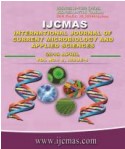


 National Academy of Agricultural Sciences (NAAS)
National Academy of Agricultural Sciences (NAAS)

|
PRINT ISSN : 2319-7692
Online ISSN : 2319-7706 Issues : 12 per year Publisher : Excellent Publishers Email : editorijcmas@gmail.com / submit@ijcmas.com Editor-in-chief: Dr.M.Prakash Index Copernicus ICV 2018: 95.39 NAAS RATING 2020: 5.38 |
Character association and path analysis studies were investigated in 2016-2017 and 2017-2018 in all physical and rhizome characters of ginger to find out the influence of characters among themselves on yield. Characters were investigated according to the DUS descriptors as described by Indian Institute of Spices Research, Kozhikode, Kerala. Number of leaves had the highest positive direct effect (1.759) on yield followed by number of shoots (1.053) and rhizome thickness (0.460). The correlation coefficients among the different characters at phenotypic and genotypic levels revealed that Rhizome thickness (0.45*) was the only trait having positive and significant correlation with rhizome yield (t/ha). Number of leaves had the highest positive direct effect on yield followed by number of shoots and rhizome thickness indicating that selection should be made on the basis of these characters taking other characters into consideration, while making improvement in yield of ginger. In cluster analysis, gap statistics was done to find optimal number of clusters and two groups of clusters were found. So, genotypes GCP-39, SEHP-9, SE-8640, SG-2640, SE-8681 and ACC-247 should be chosen for cultivation among these genotypes in this region of West Bengal.
 |
 |
 |
 |
 |